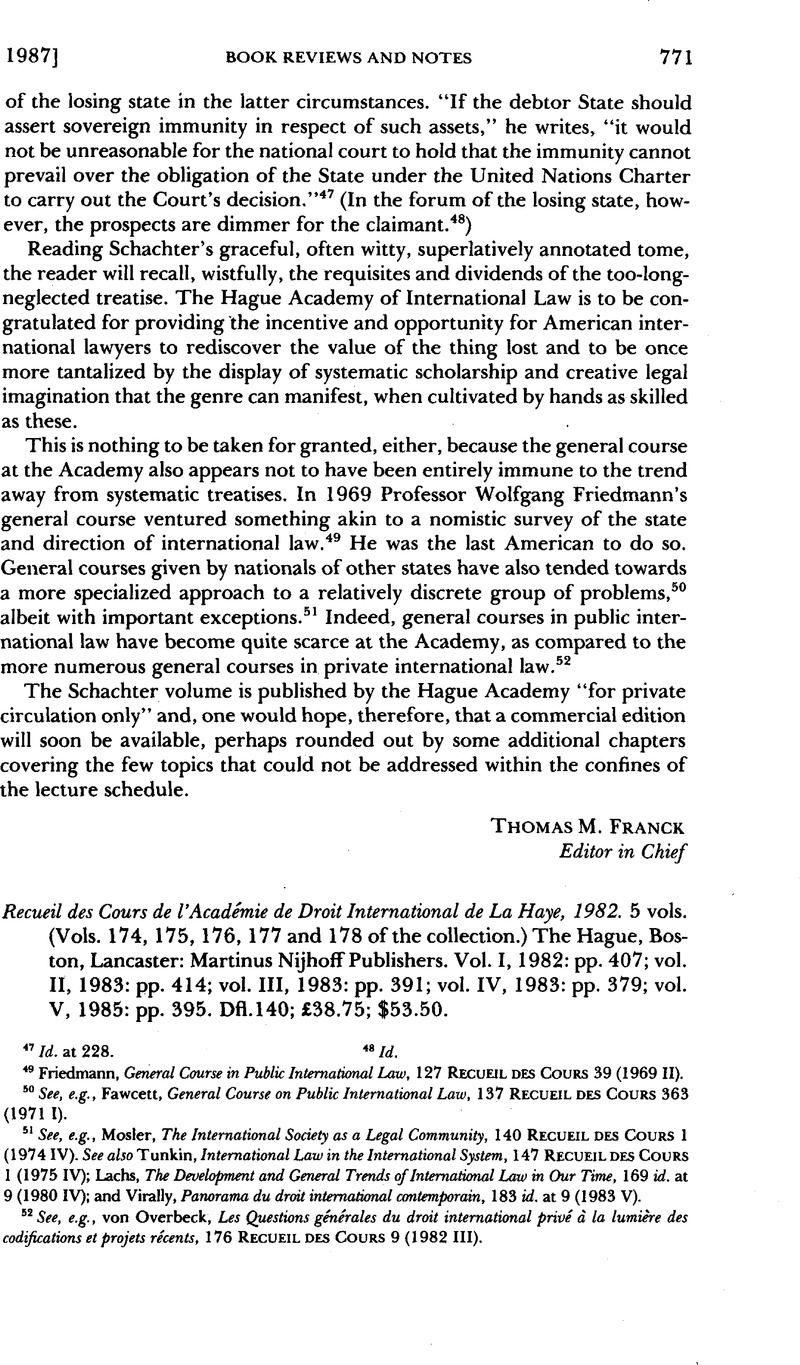No CrossRef data available.
Article contents
Recueil des Cours de l’Académie de Droit International de La Haye, 1982. 5 vols. (Vols. 174, 175, 176, 177 and 178 of the collection.) The Hague, Boston, Lancaster: Martinus Nijhoff Publishers. Vol. I, 1982: pp. 407; vol. II, 1983: pp. 414; vol. III, 1983: pp. 391; vol. IV, 1983: pp. 379; vol. V, 1985: pp. 395. Dfl.140; £38.75; $53.50.
Published online by Cambridge University Press: 27 February 2017
Abstract

- Type
- Book Reviews and Notes
- Information
- Copyright
- Copyright © American Society of International Law 1987
References
1 Aristotle rejected the notion as part of his physical natural law theory, on the ground that “conceptions of justice shift and change” (Ethics, 1134b 18 sec. 2), but it was a live issue even then, about 330 B.C.
2 McNair, A., The Law of Treaties 256–59 (1961)Google Scholar. That section deals only with “dispositive” or “real” treaties, which create relationships in fact that survive the treaties that created them, like boundary treaties. Presumably, Schachter meant pp. 259–71, which deal with “Constitutive or Semi-legislative Treaties.”
3 Not only does McNair analyze the Panama Canal situation in ways rejected in practice by both the United States and Panama, but even in mentioning briefly the Suez Canal regime, he ignores the failure of the U.S. attempt in 1956 to establish a direct beneficiary right through a “users association.” By 1982 it should have been evident that McNair’s position, whatever its merits, did not reflect state practice or opinio juris.
4 Reports of the Commission to the General Assembly, [1966] 2 Y.B. Int’l L. Comm’n 169, 231, UN Doc. A/CN.4/SER. A/1966/Add.1.
5 The Le Louis, [1817] 2 Dods. 210, 8 British and Foreign State Papers 181 (1820–1821); Treaty of Nov. 30, 1831 between Great Britain and France, 18 id. at 641 (1830–1831).
6 Done Jan. 27, 1967, 18 UST 2410, TIAS No. 6347, 610 UNTS 205.
7 Goedhuis does not make the same error, correctly citing Grotius, H., De Jure Belli a pacis, bk. II, ch. III, pt. XIII, para. 2 (1646 ed.)Google Scholar. This admission that under the legal conceptions of his time vast areas of the sea were subject to national appropriation by naval occupation on the same rationale that res nullius could be acquired on land is also in the 1632 edition of De jure. I have not been able to check the 1631 or 1625 editions.
8 The major point of the European Human Rights Convention is to require parties to apply internationally agreed standards of justice to their own nationals. The notion that a Protocol to that Convention is not applicable in those very cases seems insupportable. But the European Court of Human Rights has recently held in a case in which Professor Higgins was counsel for the respondent government that the phrase “general principles of international law” in Article 1 of the Protocol was not intended to give nationals of an expropriating party the same legal protection general international law, presumably including general principles of law recognized by civilized nations, gives to non-nationals. The distinction drawn is a subtle one whose ultimate importance cannot usefully be analyzed further here. See Case of Lithgow and Others, 102 Eur. Ct. H.R. (ser. A), paras. 111-19 (1986).




